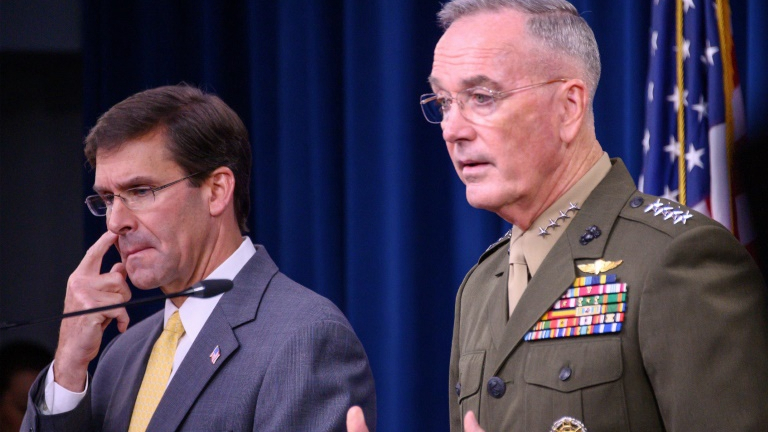

U.S. soliders are seen on duty in this undated photo after U.S. troops were first sent to Afghanistan after the September 11, 2001 terror attacks on U.S. soil carried out by terrorist group Al-Qaeda. /AFP Photo
The U.S. and the Taliban are "close" to a deal that would see the Pentagon slash troop numbers in Afghanistan, the Taliban said Wednesday, although the U.S. military insisted that the country must not become a sanctuary for extremists.
The two foes have been meeting in Doha to put the final touches on a historic deal that would see the Taliban make various security guarantees in return for a sharp reduction in the 13,000 or so U.S. troops based in Afghanistan.
"We are close to an agreement. We hope to bring good news for our Muslim and freedom seeking nation soon," Taliban spokesman Zabihullah Mujahid tweeted.
In Washington, General Joseph Dunford, chairman of the Joint Chiefs of Staff and America's most senior uniformed officer, sounded a note of caution, telling reporters on Wednesday he was not yet using the word "withdrawal" to describe the deal.

General Joseph Dunford, chairman of the U.S. Joint Chiefs of Staff (R), with Defense Secretary Mark Esper at his side, are on a press briefing in Washington, DC, U.S., August 28, 2019. /AFP Photo
"I'm using 'we're going to make sure that Afghanistan is not a sanctuary, and we're going to try to have an effort to bring peace and stability to Afghanistan,'" he said at a press briefing.
Defense Secretary Mark Esper, standing next to Dunford, also said a deal with the Taliban must guarantee that Afghanistan "is no longer a safe haven for terrorists to attack the United States."
U.S. troops were first sent to Afghanistan after the September 11, 2001 terror attacks on U.S. soil carried out by terrorist group Al-Qaeda, which was sheltered by the former Taliban regime. Washington now wants to end its military involvement and has been talking to the Taliban since at least 2018.
The agreement will center on the U.S. troops withdrawal in exchange for a Taliban guarantee that Afghanistan will not be used as a jihadist safe haven, talks with the Afghan government, and an eventual ceasefire.
Insurgent leaders were meeting at an undisclosed location along the Afghanistan-Pakistan border to review the proposed agreement, a senior Taliban commander in Pakistan told AFP. The Taliban official also noted that the consultation may take a day or two, as Taliban leadership has to take all the commanders into confidence

The Afghan government of President Ashraf Ghani has been largely sidelined from the U.S.-Taliban talks. /AFP Photo
The apparent final phase of talks heaves into view the end of an excruciating few months for Afghans, who have watched on largely voiceless as U.S. negotiators cut a deal with the Taliban while largely sidelining the government of President Ashraf Ghani.
However U.S. special envoy Zalmay Khalilzad will come to Kabul in "one or two" days to brief Ghani on the deal, said Sediq Sediqqi, a spokesman for the Afghan leader.
The Taliban has long refused to negotiate directly with the Afghan government, which it considers a "puppet regime". Since the Taliban was overthrown in 2001, the group maintains that the country has been occupied by foreign forces. The group says any engagement with the government would grant it legitimacy.
If any peace deal was to happen, it would seen several hurdles before it was implemented. Experts believe that the next phase of talks among the Afghans (intra-Afghan dialogue) will be more challenging than the U.S.-Taliban talks. And the most important factor to push a deal between the U.S. and the Taliban is U.S. President Donald Trump's determination to withdraw troops from Afghanistan regardless of the consequences.
(With input from AFP )

Copyright © 2018 CGTN. Beijing ICP prepared NO.16065310-3
Copyright © 2018 CGTN. Beijing ICP prepared NO.16065310-3